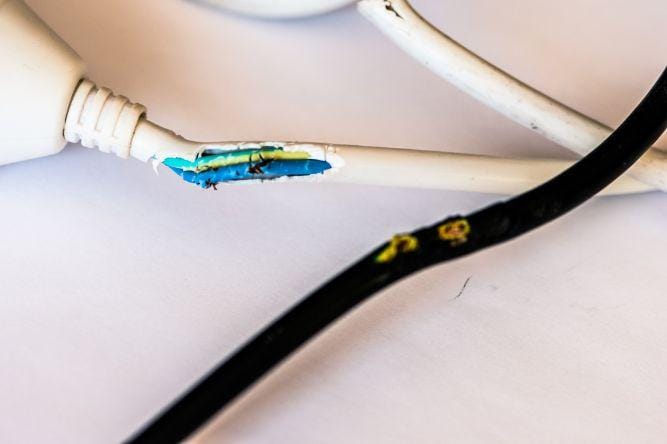

With pets, some shocks are unavoidable - like the shock of an unexpected medical bill or the shock of your cat knocking over your favourite vase at 3 AM. Static shocks can be hard to avoid, too - if you’re walking around your carpet in wool socks all day, your dog is going to get the surprise of its life when you pet it.
Serious electrical shocks, on the other hand, can and should be prevented. Let’s look at a few of the ways you can reduce the risk of your pet being harmed by electricity:
Furry and feathered friends of all kinds love to nibble on cables. You might think that seems strange, but if you’ve ever had Livewire candy in your life, you may start to see the appeal.
Realistically, animals chew on cables for a wide variety of reasons. Your cat might think cables look similar to rodent tails. Your dog may love to chew on everything: Bones, chew toys, cables, and whatever else they can find.
Anxiety, dental problems, boredom - all of these things and more can cause your pets to chew on cables. Pets are complex, and we can’t predict their behaviour - so we need to do our best to make the environments they live in as safe as possible.
The first step is getting cables away from your pets - out of sight, out of mind.
Cable management is time intensive. You’re going to have to unplug all of your cables, tie them together with cable ties (zip ties work, Velcro ties are better), then feed them through cable raceways or cable sleeves to protect them before plugging them back in.
We recommend following The Lazy Gamer’s Guide to Cable Management - the content is catered toward gamers, but it will work beautifully for home offices and home theatres. The best part? It’s incredibly simple and direct - which helps reduce some of the labour involved in the project.
Once your cables are hidden, protected, and tucked away together, your pets should be less inclined to chew at them. Every once in a while, however, an industrious, cable-loving animal will still find a way to chew on electrical cords. When that happens, we recommend buying bitter or spicy animal-safe sprays from the pet store and spraying down your cables.
Pets - especially cats - love finding a warm spot to sleep. Sometimes that spot is behind electronics, like dryers and computers. When possible, correct this behaviour - but we know pets can be stubborn. If all else fails, make the area behind your electronics and appliances inaccessible to pets. You might have to move things closer to the wall, or use pet gates or other barriers.
So far, we’ve addressed electrical shocks at home - the main theme of this article - but we wanted to take a moment to address electrical shocks that can occur while you’re on a walk with your pet. In wet conditions, including our brutal Winnipeg winters, electrical currents can sometimes occur on metal surfaces. When it’s wet or snowy outside, guide your pets away from storm drains, light posts, and other metal surfaces.
Pets will often chew on cables because:
Chewing cables is often a sign of a deeper problem. Take your pet to the vet. Find your pet other chew toys and playthings. Be sure to spend plenty of time with them, and show them lots of love!
Our electrical contractors in Winnipeg love pets - but our work can be dangerous to your furry friends. When you call us for electrical work, let us know in advance that you have pets. That way, we can show them a bit of extra love - and we can work around them to keep them safe.